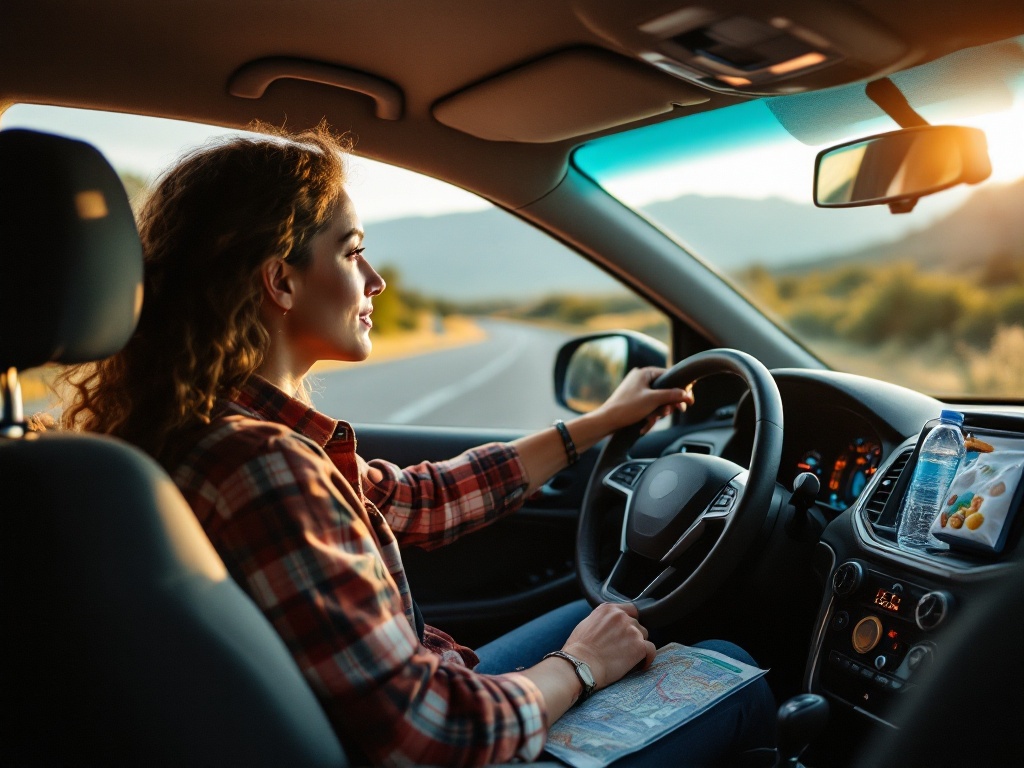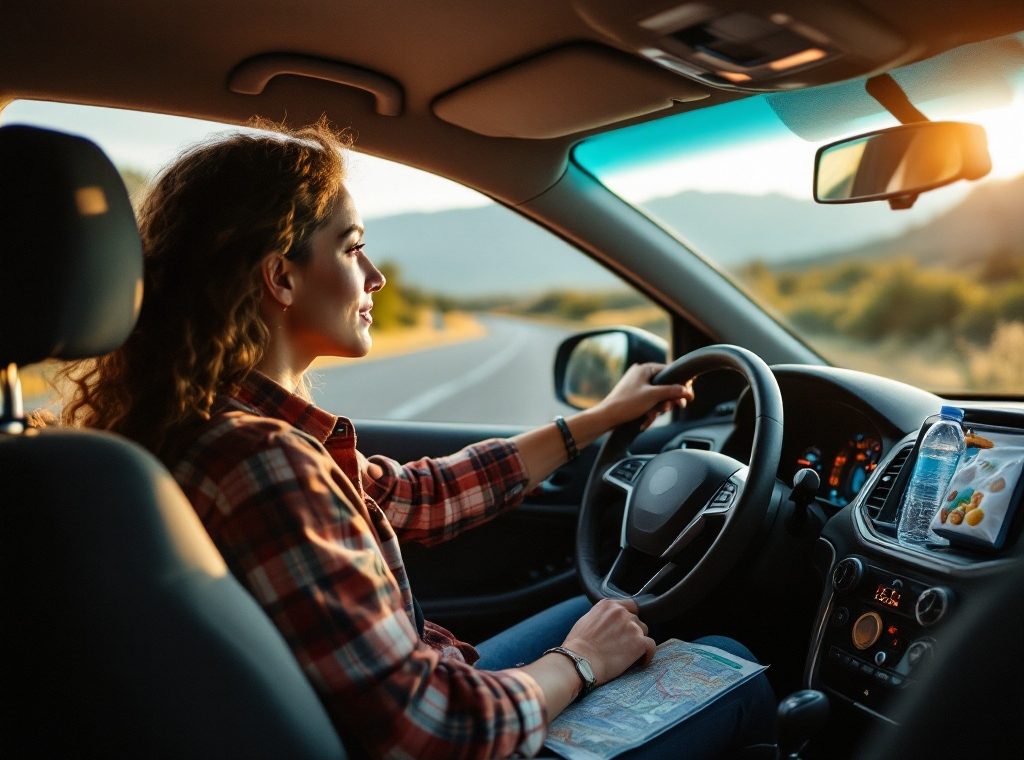What You Can Do to Prevent Drowsiness before a Trip: Most Effective Tips
Drowsy driving is a serious threat, leading to thousands of accidents annually. Learn how prioritizing 7-9 hours of sleep before a long drive drastically reduces this risk. Discover the power of short naps, regular breaks, and protein-rich snacks to combat fatigue and maintain alertness behind the wheel. This guide provides actionable strategies, from hydration tips to recognizing drowsiness signs, empowering you to arrive safely at your destination. Start your journey towards safer driving today!
Important information

- Get 7-9 hours of sleep before a long drive to maintain alertness and reaction time.
- Take regular breaks every two hours or 100 miles to combat fatigue and improve focus.
- Stay hydrated by drinking plenty of water and eat protein-rich snacks to avoid energy crashes.
- Avoid alcohol and medications that cause drowsiness as they impair judgment and slow reaction time.
- If you experience signs of drowsiness like yawning or difficulty focusing, pull over immediately to a safe location and rest.
Understanding Drowsiness Prevention Before a Trip
Prioritize sleep before your trip and aim for the recommended 7-8 hours. This not only keeps you alert behind the wheel, but also drastically reduces the risk of drowsy driving accidents, significantly improving road safety.
Why Proper Sleep is Essential for Safe Driving
Driving safely requires adequate sleep, which directly affects your cognitive functions and reaction time. Studies show that sleep deprivation impairs judgment, slows responses, and increases accident risk. Before a long drive, aim for 8 to 9 hours of sleep to maintain alertness and prevent drowsy driving incidents. Regular breaks are also crucial. Stopping every few hours helps maintain focus. While caffeine may offer a temporary boost, it’s no substitute for proper rest, which is vital for safe driving. If drowsiness sets in, a 20-minute nap can significantly improve alertness.
Get 8-9 hours of sleep before a long drive.
Take regular breaks every few hours.
If drowsy, take a short 20-minute nap.
What is Adequate Sleep and Its Benefits
Adequate sleep is essential for good health and alertness, especially for drivers. Most adults require 7-9 hours of nightly rest to enhance their mood, combat fatigue, and improve focus. These factors are crucial for safe driving, enabling quicker reactions and sustained wakefulness behind the wheel.
How Lack of Sleep Contributes to Drowsy Driving Accidents
Drowsy driving is a serious hazard. Lack of sleep impairs reaction time, clouds judgment, and induces fatigue, significantly increasing the risk of accidents. Driving while sleep-deprived, particularly on less than five hours of sleep, is comparable to driving under the influence of alcohol. The National Highway Traffic Safety Administration (NHTSA) reports that thousands of crashes annually are attributed to drowsy driving. Prioritize adequate sleep to ensure road safety.
Effective Road Trip Planning for Alertness
Start your journey early in the morning to take advantage of heightened alertness. Studies have shown that our attention spans are at their best during the morning hours.
Consider traveling with a companion. Sharing the driving responsibilities and enjoying conversation can help combat fatigue and maintain focus.
Schedule regular breaks throughout your trip. Short stops can significantly reduce fatigue and improve alertness, contributing to a safer arrival at your destination. Planning these breaks in advance ensures they happen.
Tips for an Early Start to Prevent Drowsiness
Start your trip early in the morning when you’re typically more alert. A good night’s rest is essential for maintaining energy on the road, so be sure to sleep well beforehand.
Why Planning Trips with a Companion Improves Alertness
A travel companion significantly enhances safety on long drives. Sharing the driving reduces individual fatigue and provides an opportunity for conversation, helping to keep both driver and passenger alert. This shared vigilance contributes to a safer road trip experience. Long distances behind the wheel can be tiring, but a companion can take over driving and watch for signs of drowsiness, making a notable difference in safety and enjoyment.
How Scheduled Breaks Enhance Driving Routine
Take regular breaks every two hours or 100 miles to combat driver fatigue.
These short stops improve circulation and reduce fatigue, increasing alertness and overall driving performance.
Taking a moment to stretch, walk around, and refresh can significantly lower drowsiness risks, making the roads safer for everyone.
Healthy Habits to Stay Awake on Long Trips
Safe driving depends on staying well-hydrated. Dehydration leads to fatigue and impairs your ability to think quickly. Therefore, consume plenty of water or other hydrating beverages, especially during long drives, to combat drowsiness. Nutrition also plays a vital role. Protein-rich foods, like nuts, seeds, Greek yogurt, and lean meats, help stabilize blood sugar and prevent energy crashes that can cause sleepiness. A quick 20-30 minute nap before hitting the road can sharpen your focus, and short naps during breaks can also be beneficial. Just be sure to limit their length to avoid feeling sluggish afterward. Here’s a summary of tips for staying alert while driving: stay hydrated, eat nutritious foods, and take short naps when needed.
The Role of Hydration in Maintaining Alertness
Staying properly hydrated is essential for safe driving, as it helps maintain alertness, especially during long trips. Dehydration can cause fatigue and impair concentration, negatively impacting your reaction time. Drink plenty of water before, during, and even after your trip to stay energized and prevent drowsiness. This promotes safer driving by keeping you vigilant and focused on the road.
How Protein-rich Meals and Snacks Prevent Drowsiness
For a long drive, ditch the sugary snacks and opt for protein-rich foods that provide sustained energy and keep you alert. Nuts, seeds, and Greek yogurt are excellent choices, preventing energy crashes and drowsiness. These protein-packed snacks offer a steady energy boost for a safer and more enjoyable journey. Here’s why protein is a better choice:
Sustained Energy
Protein provides a slow and steady release of energy, keeping you alert and focused behind the wheel. Sugary snacks lead to quick bursts of energy followed by sudden crashes, which can be dangerous while driving.
Improved Focus
Protein helps stabilize blood sugar levels, preventing the fluctuations that can cause drowsiness and impaired concentration. This is crucial for long drives where maintaining focus is essential for safety.
Consider packing these protein-rich snacks for your next road trip:
- Trail mix: A mix of nuts, seeds, and dried fruit provides a good balance of protein, healthy fats, and carbohydrates.
- Hard-boiled eggs: A convenient and portable source of protein.
- Greek yogurt: High in protein and can be paired with fruit or granola for added flavor and nutrients.
- Beef jerky: A shelf-stable, high-protein snack that satisfies hunger and provides sustained energy.
- Protein bars: Choose bars with a good balance of protein, fiber, and minimal added sugar.
Benefits of Pre-drive Nap and Napping During Breaks
Taking a nap before driving can greatly improve alertness and safety on the road. Short naps during breaks on long trips combat fatigue and sharpen focus, effectively reviving drivers and reducing drowsiness-related accidents. Furthermore, napping before a trip proactively enhances road safety by ensuring drivers begin their journeys in peak condition. However, it’s important to remember that these power naps are not a replacement for regular, quality sleep, which is essential for both overall health and safe driving.
Safety Precautions for Drowsy Driving Prevention
Drowsy driving is a serious hazard. Recognizing the signs is crucial for your safety. If you experience microsleeps, difficulty focusing, excessive blinking, or yawning, pull over immediately to a safe location and rest or nap.Never drive under the influence of alcohol or medications that cause drowsiness. These substances impair judgment and slow reaction time, significantly increasing accident risk. Discuss potential side effects with your doctor.For a temporary boost on long drives, consider caffeinated beverages like coffee or tea. However, remember that caffeine’s effects are temporary and don’t replace proper sleep. Adequate rest is the best way to stay alert. Plan trips with regular breaks and avoid driving during your normal sleep hours. Caffeine can also cause jitters and worsen existing sleep deprivation.
Recognizing Signs of Drowsiness and When to Stop Driving
Drowsiness behind the wheel can be dangerous. If you’re struggling to focus, yawning frequently, or find yourself drifting, pull over immediately. Locate a safe spot to rest until you’re fully alert. Don’t compromise your safety.
The Importance of Avoiding Alcohol and Sleep-inducing Medications
Driving under the influence of alcohol or sleep aids is extremely dangerous. These substances impair alertness and slow reaction time, significantly increasing your risk of an accident. Never consume alcohol or sleep aids before driving, and avoid using them while behind the wheel.
How Caffeinated Beverages Provide Temporary Energy Boost
Caffeine provides a temporary energy lift, making you feel more alert and focused. However, over-reliance on it can disrupt sleep patterns, leading to increased fatigue. Consuming excessive amounts, like multiple cups of coffee, can hinder your ability to sleep soundly. A balanced approach incorporates moderate caffeine intake with sufficient rest and hydration. Furthermore, regular exercise offers a natural energy boost. So, while that cup of coffee can be enjoyable, prioritize sleep and water for sustained energy levels. Here’s a better approach to maintaining your energy throughout the day:
Benefits of Moderate Caffeine Intake
- Increased alertness and focus.
- Temporary energy boost.
- Can enhance physical performance.
Drawbacks of Excessive Caffeine Consumption
- Disrupted sleep patterns.
- Increased fatigue.
- Can lead to anxiety and restlessness.
For sustained energy levels, prioritize:
- Sufficient sleep: Aim for 7-8 hours of quality sleep each night.
- Hydration: Drink plenty of water throughout the day.
- Regular exercise: Incorporate physical activity into your daily routine.
- Balanced caffeine intake: Enjoy caffeine moderately, being mindful of its potential effects on sleep.
Additional Tips to Drive Alert and Safe
To stay sharp on long drives, try these tips:
- Tune into some music or engage in conversation.
- Adjust your sunshades and temperature for optimal comfort and focus.
- Engage in mental stimulation, such as listening to audiobooks or playing trivia games, to significantly improve concentration.
How Music and Conversation with Passengers Keep You Awake
Music can stimulate your brain and combat drowsiness. Similarly, conversations with passengers keep you alert and engaged with your surroundings. Both activities contribute to a more enjoyable driving experience, helping you stay focused and awake.
Using Sun Shading Techniques and Air Temperature Control
Sun shades, such as visors or window covers, reduce glare and keep your car cool.
Air conditioning also promotes alertness, combating drowsiness. A comfortable temperature between 68 and 72 degrees Fahrenheit helps maintain focus.
Engaging in Mental Challenges to Stay Focused
Combat highway hypnosis with engaging mental activities. Brain teasers, word games, and trivia offer quick challenges to sharpen your focus. For deeper intellectual stimulation, consider audiobooks and complex podcasts. These activities enhance alertness on long drives.














